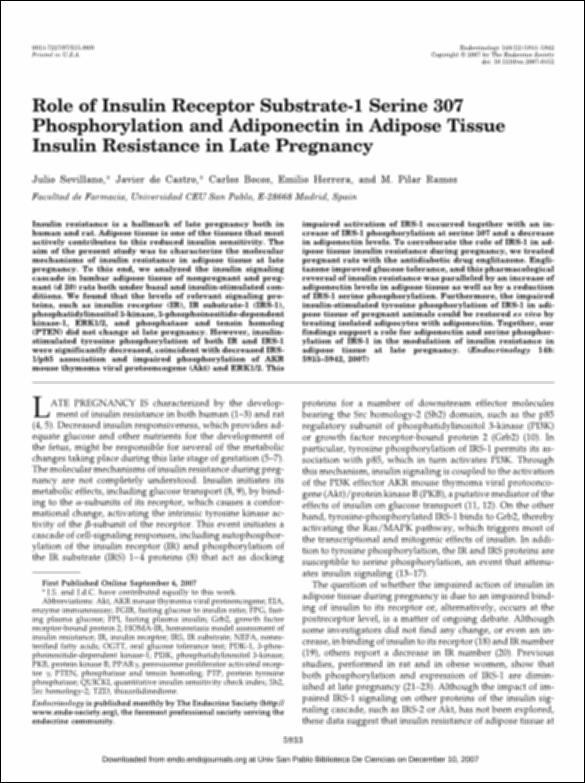Please use this identifier to cite or link to this item:
http://hdl.handle.net/10637/2867Role of IRS-1 serine/threonine phosphorylation and adiponectin in adipose tissue insulin resistance at late pregnancy.
| Title: | Role of IRS-1 serine/threonine phosphorylation and adiponectin in adipose tissue insulin resistance at late pregnancy. |
| Authors : | Sevillano Fernández, Julio Castro, Javier de Bocos de Prada, Carlos Herrera Castillón, Emilio. Ramos Álvarez, María del Pilar |
| Abstract: | Insulin resistance is a hallmark of late pregnancy both in human and rat. Adipose tissue is one of the tissues that most actively contributes to this reduced insulin sensitivity. The aim of the present study was to characterize the molecular mechanisms of insulin resistance in adipose tissue at late pregnancy. To this end, we analyzed the insulin signaling cascade in lumbar adipose tissue of nonpregnant and pregnant (d 20) rats both under basal and insulin-stimulated conditions. We found that the levels of relevant signaling proteins, such as insulin receptor (IR), IR substrate-1 (IRS-1), phosphatidylinositol 3-kinase, 3-phosphoinositide-dependent kinase-1, ERK1/2, and phosphatase and tensin homolog (PTEN) did not change at late pregnancy. However, insulinstimulated tyrosine phosphorylation of both IR and IRS-1 were significantly decreased, coincident with decreased IRS1/p85 association and impaired phosphorylation of AKR mouse thymoma viral protooncogene (Akt) and ERK1/2. This impaired activation of IRS-1 occurred together with an increase of IRS-1 phosphorylation at serine 307 and a decrease in adiponectin levels. To corroborate the role of IRS-1 in adipose tissue insulin resistance during pregnancy, we treated pregnant rats with the antidiabetic drug englitazone. Englitazone improved glucose tolerance, and this pharmacological reversal of insulin resistance was paralleled by an increase of adiponectin levels in adipose tissue as well as by a reduction of IRS-1 serine phosphorylation. Furthermore, the impaired insulin-stimulated tyrosine phosphorylation of IRS-1 in adipose tissue of pregnant animals could be restored ex vivo by treating isolated adipocytes with adiponectin. Together, our findings support a role for adiponectin and serine phosphorylation of IRS-1 in the modulation of insulin resistance in adipose tissue at late pregnancy. (Endocrinology 148: 5933–5942, 2007) |
| Description: | En: Endocrinology. 2007. n. 148 : 5933-5942 p. ISSN. 0013-7227 |
| URI: | http://hdl.handle.net/10637/2867 |
| Rights : | http://creativecommons.org/licenses/by-nc-nd/4.0/deed.es |
| Issue Date: | 19-Sep-2007 |
| Center : | Universidad San Pablo-CEU |
| Appears in Collections: | Facultad de Farmacia |
Items in DSpace are protected by copyright, with all rights reserved, unless otherwise indicated.


